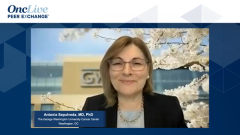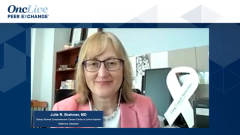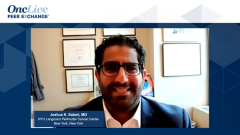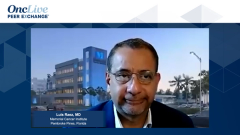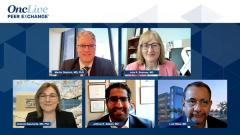
Treatment Options for Patients with NSCLC with EGFR Mutations
Key opinion leaders on non–small cell lung cancer review treatment options for patients with EGFR mutations.
Episodes in this series

Transcript:
Martin Dietrich, MD, PhD: Let’s switch gears a little bit and shift into the therapeutic space. I would like to start with some of the EGFR mutations. Obviously, we’ve seen great progress, the first molecular marker that we had in non–small cell lung cancer that really opened up the hope for what we’re seeing now. Based on the FLAURA study, I believe most of us are using osimertinib in the first-line metastatic setting, and we’ve now had some confirmatory data at ASCO [American Society of Clinical Oncology Annual Meeting] as well to see that osimertinib in the post-resection setting will be utilized as standard of care with a positive overall survival benefit. We’re waiting for the post-radiation setting, but I wouldn’t go out on a limb in my opinion if I’d say that the data would probably shake out similarly, but [I] would love to hear your opinions as well.
We’re going to have some interesting developments in combination strategies. I believe at the World Conference on Lung Cancer, we’ll be seeing the FLAURA2 data in combination with chemotherapy. We’ll be seeing the data in combination with amivantamab in the first-line setting. Improving outcomes there is certainly still the push in the field for EGFR improvement, even though the starting point is already quite good. More challenging are the uncommon EGFR mutations. Dr Raez, you’re seeing a lot of EGFR in South Florida. Can you comment on uncommon EGFR mutations, how you approach them, and what drugs you use to tackle them? Do you have clinical trials for them?
Luis Raez, MD: Yes. For EGFR, we have erlotinib. And we do erlotinib versus osimertinib and erlotinib plus chemotherapy that looks like FLAURA2. That is what we’re doing [in the] front line. In Florida, we have a lot of [Hispanic patients], so 25% of our patients are EGFR, and that’s why we are really aggressive for testing. In general, I think when we talk about uncommon mutations, we’re talking about exon 18, 768, exon 21, 861. And then the exon 19 ones, the 719, S, A, B, and C, and D. These are uncommon mutations, but there are so many variants for EGFR only that are actionable. I think we have more than 90. That’s why at the end of the day, it’s a basket with uncommon [mutations] because we identify the ones that I mentioned because we have afatinib for them. But nowadays, you can call anything an uncommon EGFR [mutation]. Six years ago, for example, we discovered in our institution the first EGFR fusion, RAD51. Now we know that EGFRs not only can be mutations but can also be fusions, and they are actionable. We have 2 or 3 already treated successfully.
In general, I think “uncommon” can be used for the ones that we reserve for afatinib. But in general, uncommon include all of these exon 20 insertions, they now have 2 drugs approved. All of these are uncommon. The idea, I think for me, the best way to catch all of them is to do the NGS [next-generation sequencing], so in that way, we don’t have to worry. I was very worried because at the beginning, when we got the approval for osimertinib, it says exon 19 and 21. And I had payers that didn’t want to give the patient any therapy if the mutation is uncommon. It’s only EGFR exon 19 variant. That’s why it’s very painful sometimes. We need to test everybody; we need to do comprehensive testing. That’s why the NGS is so important. And we also have seen that the liquid and the tissue are complementary. Sometimes the liquid doesn’t catch some things and the tissue does, and vice versa. That’s why I think it’s important to do both so we can catch all the genetic aberrations, especially EGFR, so nobody gets left behind and deprived of novel therapy.
Transcript is AI-generated and edited for clarity and readability.


